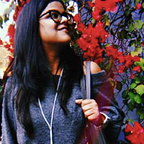C 17 — Progressive Writers: A Movement
Literature and Politics are two core concepts that cannot exist in a vacuum. Both have been influencing and affecting each other in many instances since time immemorial. Thus, when we deliberate upon the partition of India and Pakistan, from a literary perspective it is inevitable to commence without recalling the compelling stand taken by the Progressive Writer’s Movement in 1936. On a sideline, I would like to mention that I got the opportunity to visit the Jaipur Literature Fest this year, and I attended a discussion by Jawed Akhtar and Shabana Azmi on the Progressive Writers, which sparked my interest on the topic at hand.
The Progressive Writer’s movement, also known as the “Anjuman Tarraqi Pasand Mussanafin-e-Hind”, was an anti-imperialistic and left-oriented literary movement in pre-partition India which advocated social justice and equality to all with a special focus on the backward and marginalized members of the society. It was started by many pioneering intellectuals who are now celebrated as the precursors of modern literature. The writers at the forefront were Sajjad Zaheer, Dr. Mulk Raj Anand, Dr. Joshi Parshad, Pramod Ranjan Sengupta and Dr. M. D. Taseer. The PWA was formed in April 1936 in Lucknow under the leadership of Munshi Premchand.
India’s partition sparked a varied spectrum from the literary front. The progressive writers did take an adamant stand against colonialism during World War 2. But, when it comes to Indian independence, the liberation from British rule did not ensure our liberation from the dominator’s manipulative strategies. Writers expressed tremendous disquietude towards the hurried partition between India and Pakistan, and the severe negative consequences it caused.
Faiz Ahmed Faiz, an active face of the Progressive Writer’s Association tried to capture the grief and apprehension evoked under this decision in his poem “ Subh-e-Azadi”. The poet shows a tone of dejection, as well as, a sense of melancholy about the fruits of labor, as he says, this was not the dawn that India awaited so patiently for! The celeberation of Independence veiled the rotten fruit that labor bore, which was, a wide pattern of atrocities including communal violence, crimes against women, mass migration and other horrors of partition. He, however, softened the blow by using metaphors and allusions in his poem, which was often criticized by a few critics at that time. Faiz reflected the Muslim sentiment of a letdown and disappointment. In the haste of finding a convenient political solution, partition left many pertinent questions unanswered. People belonging to the lower strata of the society face the brunt of hasty decisions deliberated by the elitist few. Another pioneer of the Progressive Writer’s Movement, who vehemently wrote against communalism and religious hatred, was Premchand. “Like the donkey that wears a lion’s skin and lords over the animals in a jungle, communalism wraps itself in the garb of culture.” His words hold immense power as they seem relevant to a reader in every day and age. In 1934, he wrote an essay on “Communalism and Culture”, highlighting the communal tension between the coexistence of Hindus and Muslims. Each community infringes their idea of “culture” on the other, which becomes especially tension-causing in a country as diverse as India.
Nadeem Qasmi, who was the first General Secretary of Progressive Writer’s Movement, expressed his dismay in a more graphic tone. He voiced the exclusive hardships that women at that time faced, which often went less acknowledged by the male gaze. Manto showed complex female characters who represented the destruction caused due to religious hatred and partition. Manto showed “Mozel” in a light of agency and ownership. Mozel sacrificed her own self, in order to save the lovers who were clenched by the unjust hatred that partition caused. On the other hand, Manto also showed a helpless Sakina in “Khol do”, who was sexually victimized by a multitude of vicious predators in the society, who took advantage of the obscurity brought forward by our partition. She was gang-raped by abductors, as well as the rescuers. Partition uncovered the worst face of humanity. Around the 1940s, Ishmat Chugtai too took an audacious stand on female sexuality in her book “Lifting the veil”. She was an active member of the Progressive Writers’ Movement in India, who later branched off and spoke vehemently against its orthodoxy and inflexibility.
Progressive Writer’s Association did not keep its expression confined to India. Ali Sardar Jafri, one of the tallest pillars of the PWA, was a friend of revolutionary Turkish poet Nazim Hikmat and Nobel Prize-winning Chilean poet, Pablo Neruda. Prof. Chandrabali Singh, another member of PWA translated Neruda’s works in Hindi and released them in the Chilean Assembly. Sahitya Akademi published Neruda’s works under the name “Pablo Neruda: Kavita Sanchyan”. Some of Ali Sardar Jafri’s poems include “Irani tulaba ke naam”, (To Irani Students) “Afreeki Ladki”, (The African Maid), “Habshi mera bhai”, (The Abyssinian- My Brother) which show how the poets transcended across borders to evoke the universal sense of unity and peace. When Ahmad Faraz extended the hand of camaraderie towards India in his poem “Dosti Ka Hath”, Jafri wrote with extreme geniality, “Zameen-e-Pak hamaare jigar ka tukda hai” (Pakistan is a part of our heart).
Thus, this literary movement had the influence and power to cut across borders, and move hearts across continents. They had strong ties with Afro-Asian communities and stood firm on their Anti-fascism and Anti-imperialistic stand. They fore-fronted Third World liberation solidarity formations during the Cold War as well. According to me, literature is a symbol of liberation. When the legislation and political environment fail to acknowledge the core human right of freedom and liberty, it is the power of the pen that unites and ignites the collective conscience of the society.
